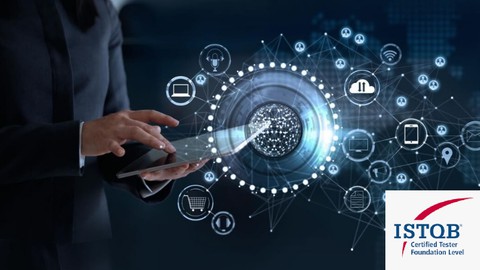
ISTQB Foundation Level Examination
ISTQB Foundation Level Examination, available at $19.99, with 25 lectures, and has 1 subscribers.
You will learn about Students can learn ISTQB Exam Syllabus with this content One week is sufficient to Learn this As per syllabus of ISTQB All the Chapters with Practice Examinations This course is ideal for individuals who are Crack ISTQB Foundation Level Exam in First Attempt It is particularly useful for Crack ISTQB Foundation Level Exam in First Attempt.
Enroll now: ISTQB Foundation Level Examination
Summary
Title: ISTQB Foundation Level Examination
Price: $19.99
Number of Lectures: 25
Number of Published Lectures: 25
Number of Curriculum Items: 25
Number of Published Curriculum Objects: 25
Original Price: $19.99
Quality Status: approved
Status: Live
What You Will Learn
- Students can learn ISTQB Exam Syllabus with this content
- One week is sufficient to Learn this
- As per syllabus of ISTQB
- All the Chapters with Practice Examinations
Who Should Attend
- Crack ISTQB Foundation Level Exam in First Attempt
Target Audiences
- Crack ISTQB Foundation Level Exam in First Attempt
The ISTQB (International Software Testing Qualifications Board) Foundation Level certification is an entry-level certification for software testers that provides an overview of software testing and its related topics. The exam assesses candidates’ knowledge of software testing principles and techniques, as well as their ability to apply this knowledge in practical testing situations.
This course covers the following chapters:
1. Fundamentals of Testing: The basic principles of testing, testing terminology, and the fundamental test process.
2. Testing throughout the Software Development Lifecycle: The different testing activities that can be carried out throughout the software development lifecycle and the benefits and drawbacks of each.
3. Static Techniques: Techniques that can be used to review documents and code without executing them.
4. Test Design Techniques: Techniques for designing tests that can be executed to validate software functionality.
5. Test Management: Techniques for managing the testing process, including planning, monitoring, and controlling.
6. Tools support for Testing: An overview of the different types of testing tools available and their benefits and drawbacks.
The exam is typically 60 minutes long, with 40 multiple-choice questions, and the passing score is 65%. The exam is available in several languages and can be taken online or at an authorized testing center. Upon passing the exam, candidates receive a certificate that is recognized internationally.
Our course content delivers you with exact weightage of the syllabus and exam pattern
Course Curriculum
Chapter 1: How to Prepare for ISTQB Foundation Level Examination
Lecture 1: How to Prepare for your Exam
Chapter 2: Chapter -1 [Fundamentals of Testing]
Lecture 1: What is Software Testing
Lecture 2: Objectives of Software Testing
Lecture 3: Testing and Debugging
Lecture 4: Tester's Contribution to Success
Lecture 5: Fundamentals of Software Testing [What, Why and Principles]
Lecture 6: Process of Testing
Lecture 7: The Psychology of Testing
Chapter 3: Chapter -2 [Testing throughout the software life cycle]
Lecture 1: Software Development & Testing Detailed ISTQB Explanation
Lecture 2: Software Models
Chapter 4: Chapter – 3 [Static Testing]
Lecture 1: Work Products Examined by Static Testing & Benefits of Static Testing
Lecture 2: Work Product Review Process
Lecture 3: Roles & Responsibilities in a Formal Review Process
Lecture 4: Review Types
Lecture 5: Applying Review Techniques & Success Factors for Reviews
Chapter 5: Chapter – 4[Test Design Techniques]
Lecture 1: State Transition Technique
Lecture 2: Boundary Value Analysis
Lecture 3: Equivalence Partitioning Technique
Lecture 4: Test Techniques Categories Classifications and Characterstics
Chapter 6: Chapter – 6 [Tools Support for Testing]
Lecture 1: Test Tool Consideration
Lecture 2: Test Tool Classification
Lecture 3: Test Tool Pupose
Lecture 4: Benefits and Risk of Automation
Lecture 5: Principles of Tool Selection
Lecture 6: Tool's Success Factor
Instructors
-
Sid e-learnings
R&D Engineer and Mentor
Rating Distribution
- 1 stars: 0 votes
- 2 stars: 0 votes
- 3 stars: 0 votes
- 4 stars: 0 votes
- 5 stars: 0 votes
Frequently Asked Questions
How long do I have access to the course materials?
You can view and review the lecture materials indefinitely, like an on-demand channel.
Can I take my courses with me wherever I go?
Definitely! If you have an internet connection, courses on Udemy are available on any device at any time. If you don’t have an internet connection, some instructors also let their students download course lectures. That’s up to the instructor though, so make sure you get on their good side!
You may also like
- Top 10 Language Learning Courses to Learn in November 2024
- Top 10 Video Editing Courses to Learn in November 2024
- Top 10 Music Production Courses to Learn in November 2024
- Top 10 Animation Courses to Learn in November 2024
- Top 10 Digital Illustration Courses to Learn in November 2024
- Top 10 Renewable Energy Courses to Learn in November 2024
- Top 10 Sustainable Living Courses to Learn in November 2024
- Top 10 Ethical AI Courses to Learn in November 2024
- Top 10 Cybersecurity Fundamentals Courses to Learn in November 2024
- Top 10 Smart Home Technology Courses to Learn in November 2024
- Top 10 Holistic Health Courses to Learn in November 2024
- Top 10 Nutrition And Diet Planning Courses to Learn in November 2024
- Top 10 Yoga Instruction Courses to Learn in November 2024
- Top 10 Stress Management Courses to Learn in November 2024
- Top 10 Mindfulness Meditation Courses to Learn in November 2024
- Top 10 Life Coaching Courses to Learn in November 2024
- Top 10 Career Development Courses to Learn in November 2024
- Top 10 Relationship Building Courses to Learn in November 2024
- Top 10 Parenting Skills Courses to Learn in November 2024
- Top 10 Home Improvement Courses to Learn in November 2024






















